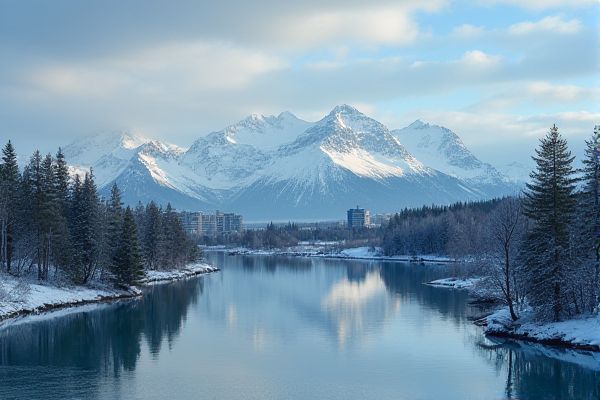
Emergency services and contact information in Alaska: Dial 911 for emergencies. Alaska State Troopers: Main law enforcement agency. Fire Department: Available in larger towns. Search and Rescue: Essential in remote areas. Local police: Limited to specific municipalities. Statewide Emergency Services: Coordinates major incidents. Medical air evacuation: Crucial for remote areas. Poison Control: 1-800-222-1222 nationwide coverage. Emergency broadcast on NOAA weather radios. Community Emergency Response Teams (CERT): Volunteer-based support.
Dial 911 for emergencies.
For life-threatening emergencies in Alaska, dial 911. This number connects you to law enforcement, fire, and paramedic services. Additional emergency and non-emergency contact numbers are provided for various services, including police, fire departments, hospitals, and specialized hotlines like the Suicide Hotline and Domestic Violence Hotline.
Alaska State Troopers: Main law enforcement agency.
The Alaska State Troopers are the main law enforcement agency in Alaska, responsible for preserving peace, enforcing laws, preventing and detecting crimes, and protecting life and property. They operate through four geographic detachments and various specialized units, including the Alaska Bureau of Investigation, Judicial Services, and the Alaska Bureau of Highway Patrol. To learn more about their services or for contact information, you can visit their website. Their headquarters is located at 5700 East Tudor Road, Anchorage, AK 99507.
Fire Department: Available in larger towns.
The Anchorage Fire Department, an ISO Class 1 public safety department, provides all-hazards prevention, education, and emergency response in Anchorage, with extensive resources and contacts available for various emergency services, including fire, EMS, and wildfire management. Similar structured fire departments are available in larger towns across Alaska, with detailed contact information and services outlined in the directory of Alaska Fire Departments.
Search and Rescue: Essential in remote areas.
In Alaska, the Alaska State Troopers hold the primary responsibility for civilian search and rescue operations. Emergencies should be immediately reported to the nearest Trooper Detachment or the Trooper Dispatch based in Anchorage. Beyond this main resource, additional invaluable assistance can be sought from entities such as the Coast Guard Rescue Coordination Center and the Civil Air Patrol, alongside various regional search and rescue organizations. For more comprehensive information on this critical subject, you can visit the Outdoors Directory Forum, which is a great resource. These organizations work collaboratively to ensure swift and effective responses to emergencies, providing vital support and coordination throughout Alaska's expansive and often challenging terrain.
Local police: Limited to specific municipalities.
If you are in the Kenai, Alaska area and require assistance, the local police department is available for contact. For emergencies, you should immediately call 911. For non-emergency administrative inquiries, you can reach them at 907-283-7879. Additionally, they are accessible via email at 911@kenai.city. The Police Chief, David Ross, can also be reached directly through email at dross@kenai.city. To learn more about their services and contact methods, visit the Police Contact Information page on their official website.
Statewide Emergency Services: Coordinates major incidents.
The State of Alaska's Emergency Operations Plan orchestrates the management of major incidents through the Division of Homeland Security and Emergency Management, facilitating a unified response by local, tribal, state, federal, volunteer, and private agencies to effectively handle emergencies and disasters. For more detailed information, you can access the Alaska Emergency Operations Plan by visiting the official State of Alaska's Emergency Operations Plan document. This comprehensive coordination ensures that all agencies are aligned in their efforts to safeguard the community and respond efficiently to any threats or disasters. Contact numbers are available for immediate assistance when needed.
Medical air evacuation: Crucial for remote areas.
Medical air evacuation is crucial in Alaska, especially for remote areas without access to hospitals. These regions rely on air ambulances and services like AeroMed International and the U.S. Coast Guard to transport patients to medical facilities. Often operating under challenging conditions, such as limited daylight and lack of runway infrastructure, these services are vital for the health and safety of Alaskans. The necessity for efficient remote access has been highlighted in various studies and reports, including one by the Federal Aviation Administration, which delves into the technological advancements aiding these critical operations.
Poison Control: 1-800-222-1222 nationwide coverage.
The national, toll-free Poison Help line connects you to your local poison center, providing 24/7 expert advice for poisoning emergencies across the United States and many territories. For more detailed information on how to find your local poison center, visit the official Poison Help website, which offers resources and guidance to ensure you receive immediate and accurate assistance in critical situations.
Emergency broadcast on NOAA weather radios.
The NOAA Weather Radio (NWR) is an essential nationwide network that broadcasts continuous weather and emergency information directly from the National Weather Service. This invaluable service includes warnings, watches, forecasts, and other hazard information 24/7, ensuring coverage of natural, environmental, and public safety hazards. To access these vital updates, a special radio receiver or scanner is required to receive the signals. For more information, you can visit the National Weather Service website, which details the network's operations and the importance of staying informed during emergencies.
Community Emergency Response Teams (CERT): Volunteer-based support.
The Community Emergency Response Team (CERT) program in Alaska educates volunteers on disaster preparedness and basic disaster response skills, including fire safety, light search and rescue, team organization, and disaster medical operations, to support professional responders during disaster situations. Through the CERT program, volunteers are equipped to provide essential aid and structure in their communities when disasters strike, enhancing the overall resilience and safety of the area.
